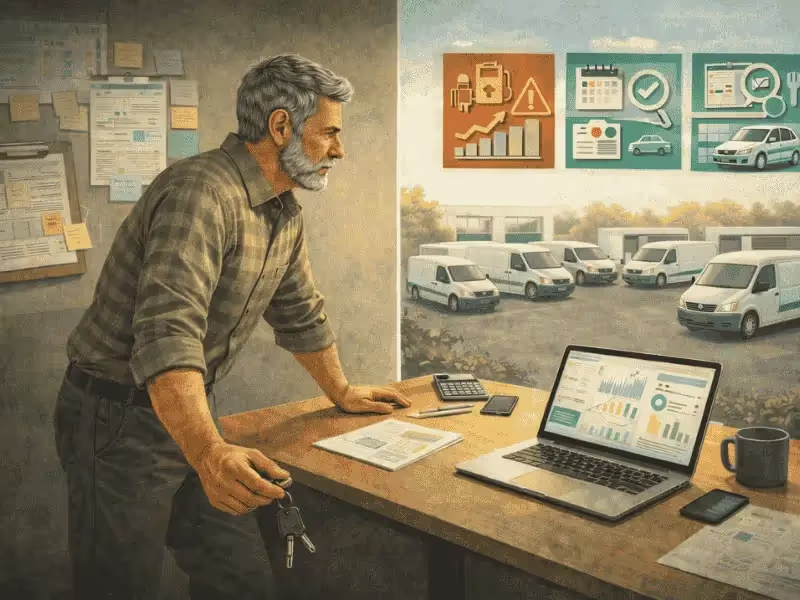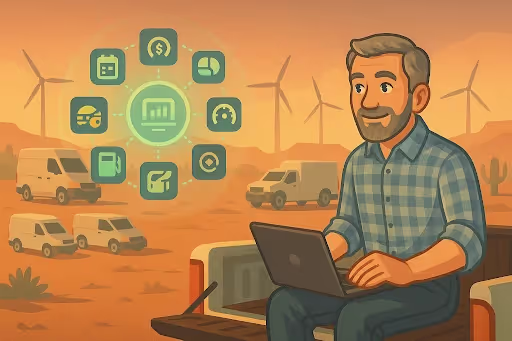Key Takeaways
Fleet managers don’t just keep vehicles running. They keep businesses moving. They're the unsung operators behind every delivery made, every student safely transported, every site powered with equipment that shows up on time and works.
Whether you're overseeing 10 delivery vans or 200 school buses, the demands are nonstop: reduce downtime, stay compliant, manage drivers, control costs—and do it all with yesterday’s budget.
So what does it actually take to thrive in this role?
This post breaks it down. You’ll find core responsibilities, essential skills, and the less-obvious challenges that catch new managers off guard. And then, we bring in three seasoned pros—people who’ve lived it—to share what they wish they’d known when they started.
What Does a Fleet Manager Actually Do?
Fleet managers sit at the intersection of maintenance, logistics, compliance, operations—and increasingly, data. Whether it’s keeping up with regular preventive maintenance scheduling, monitoring inspections, or responding to unexpected repairs, they orchestrate it all.
Their responsibilities usually include:
- Scheduling and tracking vehicle maintenance
- Ensuring inspections and compliance tasks are completed
- Managing fuel usage and expenses
- Coordinating repairs, parts orders, and vendor communication
- Leading driver communication, safety programs, and onboarding
- Monitoring vehicle lifecycles (buying, replacing, disposing)
- Reporting on performance and KPIs
- Implementing and maintaining fleet software systems
In smaller fleets, they might also be the IT guy, emergency contact, parts runner, and yes—sometimes the one jumping behind the wheel.
The Skills That Set Great Fleet Managers Apart
You can learn the tasks. But thriving in this role takes something more. These are the skills that separate high-functioning ops from daily chaos
1. Operational Foresight
You can’t just respond to problems. You need to see them coming. The best fleet managers plan maintenance schedules by season, track lifecycle costs, and know which vans will need tires next quarter.
2. Technical Confidence
You don’t have to be a mechanic—but you should know when a squeaky brake means danger. You’re the translator between techs and the C-suite. That requires fluency in both.
3. Clear, Cross-Team Communication
You’re talking to finance, mechanics, dispatchers, and sometimes city officials—all before lunch. The job demands empathy, clarity, and the ability to turn a complex problem into a 30-second update.
4. Data Comfort
Data isn’t a nice-to-have anymore. It's how you justify your budget. Defend your costs. Spot patterns before they become fires. The best managers live in spreadsheets and dashboards.
5. Calm Under Chaos
Things will go wrong. Vehicles break down. Drivers call out. Parts go backordered. Your calm in the storm sets the tone for everyone else.
6. Relentless Curiosity
Fleet tech is evolving. Fast. From AI-powered maintenance predictions to EV integrations, the tools are changing—and the best managers are the ones asking, “What can we do better?”
Challenges That Sneak Up on You
Here’s what most fleet managers don’t expect when they step into the role
- Paperwork overload: Logs, forms, audits. Often still manual. Always time-consuming.
- Invisible costs: Fuel waste, part markups, underutilized assets. They add up—fast.
- Team buy-in: That shiny new system won’t save you if your drivers and techs won’t use it.
- Reactive culture: When you’re always fighting fires, you never build the systems that prevent them.
- Vendor fatigue: Juggling third-party shops, parts suppliers, and maintenance contracts is its own full-time job.
You don’t get trained on most of this. You just learn it. Usually the hard way.
Download our free Fleet Automation Readiness Checklist
Real Advice from Fleet Veterans
We could give you advice. But we'd rather give you something better: real lessons from people who’ve lived it.
Here’s what three seasoned fleet pros wish they’d known when they started.
Charles Guthro
Fleet Management Consultant
Charles Guthro has spent over 40 years shaping how fleets run across public works, utilities, and enterprise operations. From his leadership at ARI and Hydro One to his current work as a consultant, he’s known for turning complex systems into high-performing operations. Now, he's focused on helping the next generation lead with clarity, data, and real-world discipline.

"You are only as strong as your weakest link. Following foundational Fleet Asset Management Principles is absolutely vital. Taking your eyes off of any of these principles leads to costly downstream impacts. Use data to move from a break-fix mentality to predict-and-prevent. When buying your vehicle, did you choose the lowest price—or the lowest lifetime cost per mile? Are you tracking median time between breakdowns, cost per repair, maintenance cost per gallon of fuel? These aren’t just metrics. They’re survival tools."
Alfred Karam
Director of Transportation
An award-winning Director of Transportation, Alfred brings decades of experience in school fleet operations.Known for turning complex systems into smooth, safe outcomes, he blends strategy with on-the-ground know-how.From compliance to coaching, he’s shaped fleets that actually work—and last.

"Fleet management isn’t just about keeping buses running. It’s about strategic planning, people leadership, and foresight. Get to know your drivers, mechanics, and vendors and don’t be afraid to ask questions or admit what you don’t know.
Embrace technology sooner. Invest time in learning systems that track maintenance, fuel efficiency, driver behavior, and routing—it will pay off tenfold. And never stop being an advocate for your team. Know your numbers, explain what you need, and never forget—you’re trusted with people’s lives. That’s worth showing up for every day."
Ernest Acevado
Director of Fleet Maintenance
Ernest is a fleet operations veteran turned tech collaborator—someone who’s spent 25+ years in transportation and nearly a decade building the tools that power it. From product design to advisory roles at companies, he’s helped shape the future of fleet software. With 20+ consulting engagements behind him, he’s now focused on SaaS, IoT, and platforms that bridge real-world operations with smart digital systems.

Fleet management has evolved so rapidly over the last eight years that if I could speak to my younger self, I’d say: The future is coming—don’t be afraid. Embrace it and prepare for it, because once it begins, nothing will be the same. The rise of data has completely transformed how we maintain, monitor, and optimize fleets. Fleet management, as you know it, will never be the same again."
Here’s what the smartest fleet managers figure out—often after a few hard lessons:
- Data beats gut. If you’re guessing, you’re bleeding money somewhere.
- Principles matter. Skip them once, and it always comes back around.
- People are the edge. You don’t manage vehicles—you manage the humans around them.
This job isn’t about knowing everything.
It’s about building systems that catch what you miss.
And having the awareness to fix what’s not working—before it breaks something bigger.
What Now?
Pick one thing you’ve been putting off:
That recurring issue no one’s solved. The number no one tracks. The tech your team half-uses.
Fix it.
Not tomorrow. Now.
Because fleet leadership isn’t about putting out fires.
It’s about making sure they don’t start in the first place.
If You're Just Getting Started...
You don’t need to be perfect. But you do need to be proactive.
Here’s where to start:
- Build systems before chaos builds them for you
- Use data to spot problems before they hit the road
- Choose tools that make you faster, not just busier
- Set expectations with leadership and document everything
- Earn trust from drivers and techs through clarity, not control
Simply Fleet helps with all of that.
We built it so that new managers can work like pros—and pros can stop being stuck in spreadsheets. From inspection tracking to reminder scheduling, Simply Fleet makes the complex parts of your job easier to manage.
Want more insights like this?
Follow Simply Fleet on LinkedIn for real-world advice from the people actually doing the work.
Or better—add your voice to the mix.
Got a lesson you learned the hard way? A system that changed your game?
Send it our way.
We’re building a space for fleet pros who aren’t just managing—they’re evolving.
They stay curious. And they keep getting better.



.png)








.png)


.png)
%20(1).avif)


.avif)



![How to Pass a DOT Safety Audit 2026 [Updated]](https://cdn.prod.website-files.com/635a0e49befa0ca3ff6c055a/68b044c8ce44edb6bbb60d7d_How%20to%20Pass%20a%20DOT%20Safety%20Audit%20A%20Complete%20Guide%20for%20Fleet%20Managers%20(2025).avif)


